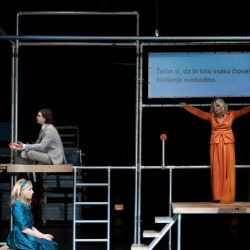Jean-Paul Sartre (1905–1980) was a French philosopher, playwright, novelist and literary critic, as well as a leading figure in 20th-century French philosophy. As one of the key figures in the philosophy of existentialism, he influenced European consciousness with his seminal philosophical work, Being and Nothingness (L'Être et le Néant, 1943). In 1964, he refused, on moral grounds, the Nobel Prize for Literature awarded to him »for a work rich in ideas, full of the spirit of freedom and the search for truth, which has had a far-reaching impact on our times«. He was also a moralist, a political activist, a human rights fighter; his philosophy of existentialism had a profound impact on the world of philosophy and literature, while his writings continue to shape our understanding of human existence. His philosophy is based on the view that there is no God and that man is free to create their own existence, being the sum of one’s actions; man is thus defined by his actions only. In this sense we must understand his oft-quoted thought: “Existence precedes essence.”
No Exit (1944) is an existentialist drama that establishes hell at the very core – in people. »Hell is other people.« No Exit was first performed at the Vieux-Colombier theatre in 1944, just before the liberation of Paris from the German occupation.
The central theme of the play is to prove the human capacity for torture is. At the beginning, we find ourselves in a company of a valet who, together with Garcin, enters a room devoid of torture devices, a sharp knife or any other object of physical torture. There is only a throne in the room, from another realm, ready for a man, a king or queen of hell, a king or queen of torture, a king or queen of hellish words and deeds. A throne, ready for the theatre of situations, as Sartre himself called his playwriting. Garcin is soon joined by Estelle and Ines. Together they form a hellish group, and this will be the starting point of the upcoming director’s and staging consideration.
Jean-Paul Sartre constructs hell as a hellish situation of human relationships. He depicts hell in many details, themes, and questions that one asks when one reflects, when one tries to capture one’s life freely in its totality. For it is the freedom that establishes or erases the boundaries of hell and transforms or defines the entrapment of human existence.
The production uses the playscript in its entirety, while the staging language will seek to find parallels in the intergenerational perception of hell. It will raise the question of what is the meaning of freedom and entrapment. It will question different strategies of human situations of hell, without mirrors. The staging principle will thus be a hellish structure, and will provide a multi-perspective attempt to allow the spectators to feel, sense, reason intellectually and enlighten spiritually – in short, a theatrical experience suggesting a catharsis.
Hell as a hellish situation of human relationships.
Translator Živa Čebulj
Director Mateja Kokol
Dramaturg Katja Gorečan
Set designer Mark Požlep
Costume designer Iris Kovačič
Composer Nebojša Pop Tasić
Lighting designer Darjan Domadenik
Language consultant Živa Čebulj
Cast
Valet Tarek Rashid
Estelle Eva Stražar
Inès Jagoda
Garcin Lovro Zafred
Opening night 19 January 2024
Performance duration: 1 hour and 25 minutes. No interval.
We would like to express our thanks to Dr. Polona Selič–Zupančič, Dr. Vladimir Milošević and Dr. Blaž Kavšek.
Stage manager Zvezdana Kroflič Štrakl • Prompter Simona Krošl • Lighting master Uroš Gorjanc • Sound master Drago Radaković • Property master Manja Vadla • Front-of-house Đorđe Dimitrijević • Make-up artist and hairdresser Andreja Veselak Pavlič • Hairdresser Sibila Senica • Wardrobe masters Suzana Pučnik, Maja Zimšek • Tailor Anita Kragelj • Seamstress Ivica Vodovnik • Head of construction Gregor Prah • Technical manager Aleksandra Štern • Assistant technical manager Rajnhold Jelen
















